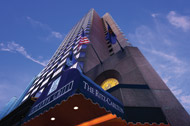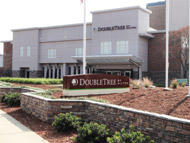|
COVER STORY, JUNE 2012
CHECKING IN ON HOTEL RENOVATION
Economic recovery paves the way for owners to breathe new life into portfolios.
Savannah Duncan
 |
A rendering of the 251-room Louisville Marriott East, located in Jeffersontown, Kentucky. The hotel, which is owned by
RockBridge Capital and Musselman Hotels, will open this month following a major renovation. |
|
After sitting on the back burner for years, hotel redevelopment is once again heating up. With an uptick in occupancy and revenue per available room (RevPAR) in many markets, hotel owners are feeling more comfortable plowing money into renovation projects.
According to Hendersonville, Tennessee-based Smith Travel Research (STR), RevPAR in the South Atlantic and East South Central markets in April was $65.87, up from $63.49 a year earlier. Additionally, occupancy was 63.9 percent, compared to 63.4 percent in April 2011.
“During any recession, you defer projects, maintenance and big-ticket items because cash flows are reduced,” says Joseph Smith, executive vice president with Chesapeake Hospitality, a Greenbelt, Maryland-based hotel management company.
With an increased flow of capital, owners are taking on both large and small renovation projects.
Southeast Real Estate Business spoke with hotel owners and managers to find out who is driving renovation work and what kinds of renovations are taking place at hotels in the Southeast.
Brand Standards
 |
Above: BEFORE / Below: AFTER
RockBridge Capital will invest $21 million to renovate and reflag the Atlanta Perimeter hotel, formerly a W hotel, under
Starwood’s Le Méridien brand. Renovations will include guest rooms, expansion of the lobby bar and restaurant, an upgrade of the exterior façade, a new fitness center and upgraded meeting space.
|
|
|
With capital flowing back into the hotel sector, brands are no longer sitting on the sidelines. Smith says that while many brands allowed owners to defer maintenance during the Great Recession, they are now asking that hotels be brought back up to brand standards.
“For most hotel owners, the brands definitely understood and worked with us during the downturn to help everyone preserve capital,” says Rob Hays, senior vice president of corporate finance and strategy at Dallas-based Ashford Hospitality Trust (NYSE: AHT), a publicly traded real estate investment trust (REIT) that owns 125 hotel assets nationwide. “Now brands are starting to come back and be a little bit more bold in what they are asking for from their owners.”
Some brands are still being flexible with owners who are struggling financially. “The brands are still being reasonable on a case-by-case basis,” says Jonathan Benowitz, managing director of Columbus, Ohio-based RockBridge Capital’s investment group. RockBridge Capital is both a debt investor and an equity owner. “However, in situations where the hotel has fallen into dire shape the brands are more aggressive in terms of de-branding or trying to force capital to be spent.”
Some owners don’t let real estate cycles dictate when hotel improvements will be made. Steve Schafer, vice president of investor relations for FelCor Lodging Trust, says the company has a renovation program in place that’s aggressive in nature. Each year, FelCor renovates between six to eight properties. On average, its hotels are renovated every 7 years.
“We operate differently than others in that we have a 20-year capital plan for every hotel,” Schafer says. “This allows us to more efficiently renovate our hotels without having deferred maintenance or needing to renovate a large number of hotels in any given year. Our portfolio remains in good shape, and we can retain or improve our competitive position in the market.”
While annual spending varies, on average, the company spends between 5 and 6 percent of revenues long-term on renovations. This year, FelCor will spend slightly more than normal because of the size and nature of the projects. Schafer says total spending this year will be approximately $120 million.
When it comes to financing a renovation, Smith says that banks will provide financing in certain circumstances. “If an owner has a good performing property and has been established with its bank for a long time, going back to them for renovation dollars is usually not a problem,” he says.
However, lenders are more interested in funding acquisitions, Hays adds. “For smaller projects, owners might be able to secure funding with local banks,” he says. “For regional or larger banks, there’s little appetite for that. They’d rather fund an existing asset where they aren’t taking development or construction risks.”
Key Projects
Ashford is working on several projects throughout the Southeast. Recently, the REIT completed a $1 million renovation of the meeting space at the 444-room Ritz Carlton in Atlanta. Ashford also started an $8 million redevelopment of all of the guest rooms and public spaces at 240-room The Melrose Hotel in Washington, D.C.
 |
Ashford Hospitality Trust recently completed a $1 million renovation at the
444-room Ritz Carlton in Atlanta. The hotel received upgraded meeting space. |
|
The REIT’s most ambitious project is at its Renaissance Hotel in Nashville, which is connected to the city’s existing convention center. The hotel, which has more than 700 rooms, will receive a full room renovation at a cost ranging from $13 million to $20 million. The renovation is slated for completion in the second quarter of 2014.
Ashford is also in talks with the city to take over some or all of the meeting space at the attached convention center when the new Nashville Convention Center opens in spring 2013.
Ashford’s Nashville project comes amid improving market conditions locally. According to STR, occupancy in Nashville in April of this year was 68.4 percent, compared to 65.2 percent in April 2011.
Ashford generally prefers to upgrade public spaces before guest rooms, says Hays. “We’ve always found that the more bang for your buck comes from public spaces,” he emphasizes. “That’s where the impression of your hotel first hits your customers. Room renovations always look really nice, but rarely do they move the needle unless you are doing a complete re-do.”
RockBridge Capital also has several projects underway. In Jeffersontown, Kentucky, RockBridge Capital and Musselman Hotels recently completed a major renovation of the 251-room Louisville Marriott East.
 |
Chesapeake Hospitality has completed a $4.6 million renovation, converting a former Holiday Inn to the DoubleTree by Hilton Raleigh-Brownstone University. |
|
In May, the company acquired the 275-room Atlanta Perimeter hotel, with plans to renovate and reflag the property under the Le Méridien brand. The $21 million renovation will include guest rooms, expansion of the lobby bar and restaurant, an upgrade of the exterior façade, a new fitness center and an upgrade for meeting spaces.
“The Atlanta Perimeter hotel had been undercapitalized,” Benowitz says. “It was initially branded as a W hotel, but Atlanta has too many W’s. Le Méridien is an underrepresented brand in the U.S. There are only 10 in the country.”
Additionally, the company is working on a renovation at the 330-room Wynfrey Hotel in Birmingham, Alabama. RockBridge Capital, the majority owner of the property, is investing between $17 million and $18 million for what Benowitz refers to as a comprehensive renovation, which will be completed next spring.
“The hotel has good bones,” he says. “The renovation is really more of a remodel of what’s there.” The project will include new carpets and beds in the guest rooms, as well as modernization of the elevators, front desks and systems. Additionally, some exterior work will take place, including improvement to the foundation of the parking garage and new signage. Completion is slated for the first quarter of 2013.
“Birmingham is a solid market with a lot going for it,” Benowitz says. “It’s the center of the state, so everything that goes on in Alabama, be it a Crimson Tide game or the Talladega NASCAR race, people stay in Birmingham.”
According to STR, the performance of Birmingham’s hotel market has dipped over the past year. In April 2011, occupancy stood at 62.6 percent, but it fell to 54.8 percent in April 2012. Additionally, RevPAR in April was $43.02, down from $50.04 a year earlier.
After the tornadoes hit Alabama last year in late April, there wasn’t a room available in all of Birmingham because Alabama Power, the Red Cross and displaced people needed rooms, Benowitz says. He notes that May occupancies were also down compared to the high May 2011 occupancy rates related to increased demand following the tornadoes.
In February, Chesapeake Hospitality completed a $4.6 million conversion and renovation of the 190-room DoubleTree by Hilton
Raleigh-Brownstone University in Raleigh, North Carolina. Previously, the hotel was a Holiday Inn.
Construction included a redesign and upgrade of all the guest rooms, a newly designed open lobby concept with a large atrium fireplace, new lounge seating and a multipurpose library.
The market in Raleigh is experiencing an interesting divide between occupancy and RevPAR. Occupancy in Raleigh in April 2012 was 64.7 percent, down slightly from 66.8 percent a year earlier. However, RevPAR in April of this year was $55.41, up slightly from $54.62 in April 2011. Room rates in Raleigh are driving up overall RevPAR, despite a slight dip in occupancy.
In Jacksonville, Florida, Chesapeake Hospitality also recently completed a $2 million project at the 292-room Crowne Plaza. The hotel received a new exterior as well as an entire guest room renovation.
FelCor has three projects under construction in the Southeast, including a $13 million renovation at the 255-room Embassy Suites – Myrtle Beach Resort, a $5 million project at the 208-room DoubleTree in Charlotte’s South Park area and a $2 million renovation at the 229-room DoubleTree Orlando in Walt Disney World.
The timing is right for property updates. According to PKF Hospitality Research, 72 percent of U.S. hotels posted an increase in profits year-over-year in 2011, up from just 8.6 percent in 2009. Nationally, PKF expects RevPAR to increase a healthy 5.8 percent in 2012 after surging 8.2 percent in 2011. Clearly, hotel owners have the wind at their backs. This is the time to renovate properties in order to regain or maintain marketshare.
©2012 France Publications, Inc. Duplication
or reproduction of this article not permitted without authorization
from France Publications, Inc. For information on reprints
of this article contact Barbara
Sherer at (630) 554-6054.
|
